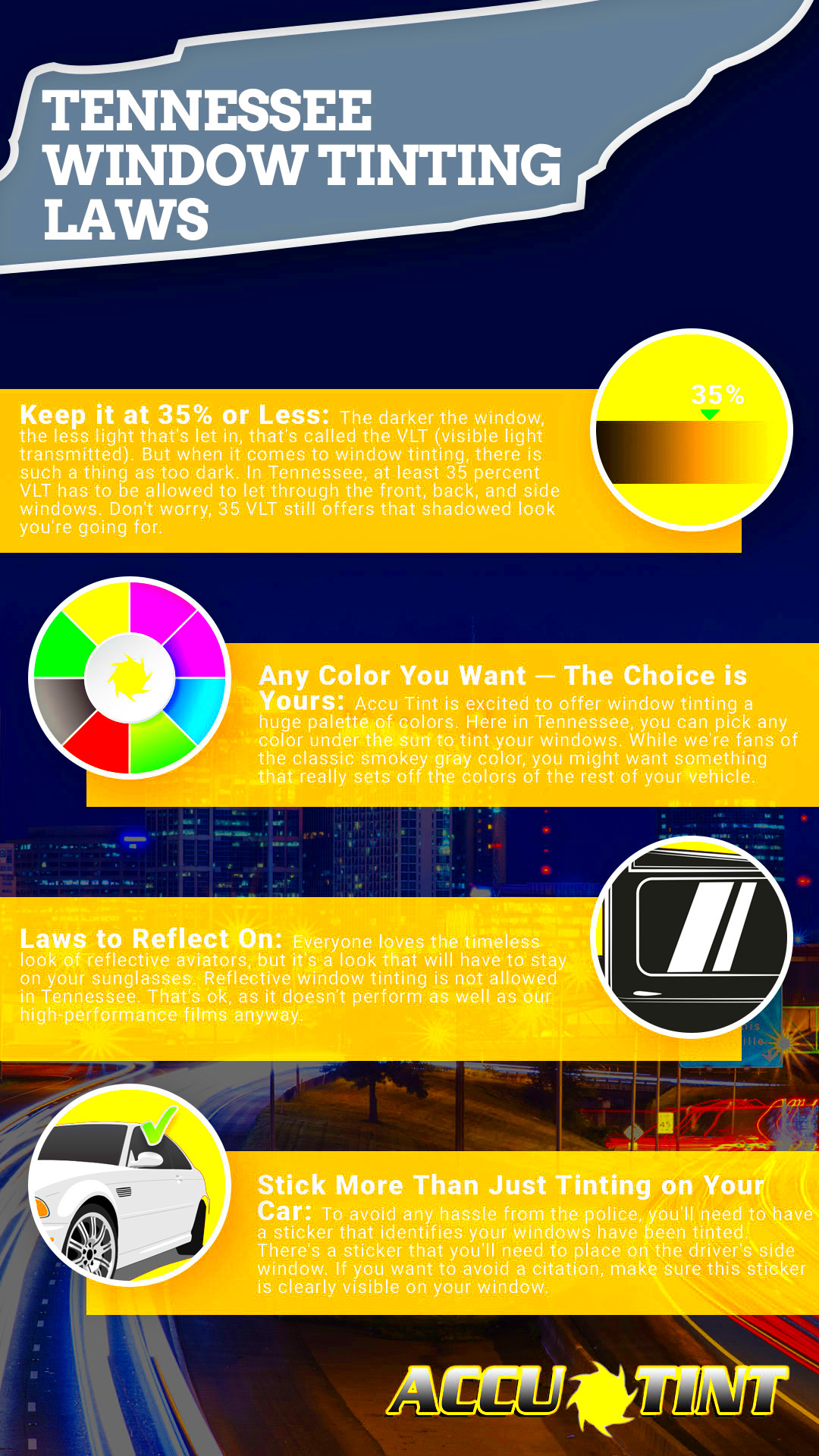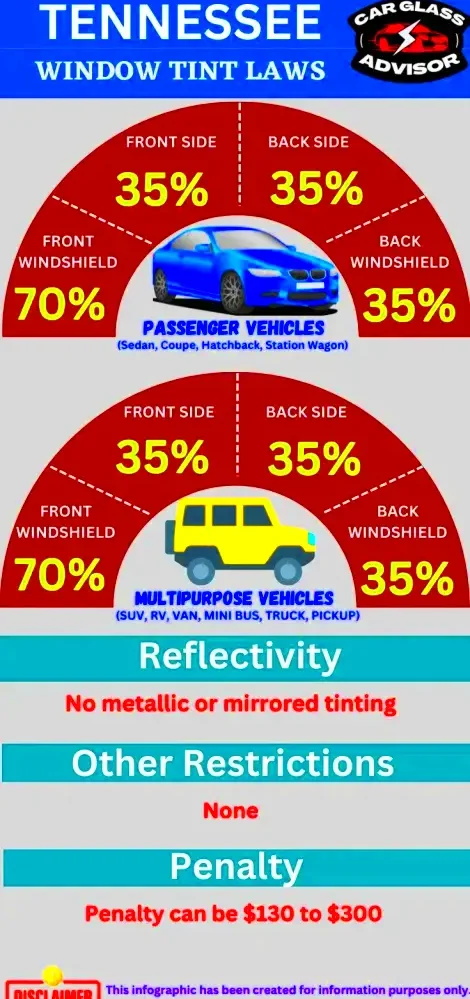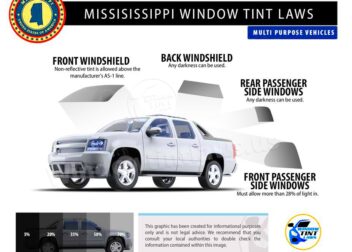Understanding Tennessee Window Tint Law for Drivers
When it comes to driving in Tennessee, understanding the window tint law is essential for every driver. This law regulates how dark or reflective your vehicle’s windows can be. The primary aim is to ensure safety on the roads while balancing personal comfort and privacy. Knowing these rules can help you avoid fines and ensure your vehicle meets state requirements.
Reasons for Window Tint Regulations

Window tint regulations exist for several important reasons:
- Safety: Clear visibility is crucial for safe driving. Tinted windows can impair visibility, especially at night.
- Traffic Enforcement: Law enforcement officers need to see inside vehicles to ensure safety during traffic stops.
- Protecting Interior: Tints can protect your car’s interior from UV damage, which can cause fading and deterioration over time.
- Comfort: Tinting can reduce glare from the sun and keep the car cooler, enhancing comfort for drivers and passengers.
Types of Window Tint Allowed in Tennessee
Tennessee law permits several types of window tint, but there are specific regulations to keep in mind:
| Window Type | Visible Light Transmission (VLT) Limit | Reflectivity Limit |
|---|---|---|
| Front Windshield | Top 5 inches can be tinted; no specific VLT limit for this section | Non-reflective |
| Front Side Windows | At least 35% VLT | Non-reflective |
| Back Side Windows | No specific VLT limit | No specific limit |
| Rear Window | No specific VLT limit | No specific limit |
It’s essential to check with your tint provider to ensure compliance with these regulations. Remember, regulations can change, so always stay updated!
Visible Light Transmission Requirements
Visible Light Transmission, or VLT, is a crucial measurement when it comes to window tinting. It refers to the percentage of visible light that can pass through your car windows. In Tennessee, the VLT requirements differ based on the type of window, and adhering to these limits is vital for legal tinting. Understanding these requirements helps you select the right tint level for your vehicle while ensuring safety and compliance.
Here are the key VLT requirements in Tennessee:
- Front Windshield: The top 5 inches of the windshield can have a tint, but there is no VLT limit for that section. However, the rest of the windshield must allow more than 70% of light to pass through.
- Front Side Windows: These must have a minimum of 35% VLT, meaning at least 35% of light must be visible through the tint.
- Back Side Windows and Rear Window: There are no specific VLT limits for these windows, allowing for more flexibility in tint choice.
It’s essential to ensure your window tint meets these VLT requirements to avoid fines and keep your vehicle compliant with state laws.
Front and Rear Window Tint Restrictions
Tennessee has specific restrictions regarding window tinting on both the front and rear windows of vehicles. These regulations are designed to ensure safety for drivers and passengers while maintaining visibility for law enforcement. Here’s what you need to know:
- Front Windshield: You can tint the top 5 inches of the windshield, but the rest must allow more than 70% of light to pass through.
- Front Side Windows: These windows must have a minimum VLT of 35%, which means they cannot be too dark.
- Back Side Windows: There are no VLT restrictions on these windows, allowing for darker tints if desired.
- Rear Window: Similar to the back side windows, the rear window can also have any level of tint without specific restrictions.
Following these restrictions is important to avoid legal issues and ensure your safety while driving. Always check with a certified installer to ensure your tinting meets these standards.
Medical Exemptions for Window Tint
In Tennessee, certain individuals may qualify for medical exemptions that allow for darker window tinting than the standard regulations permit. This exemption is designed for people with specific medical conditions that require additional protection from sunlight. If you believe you qualify, here’s how the process works:
To obtain a medical exemption for window tint:
- Consult Your Doctor: You’ll need a signed letter from a licensed physician detailing your medical condition and the necessity for darker tinting.
- Apply for the Exemption: Submit your doctor’s letter along with a request to the appropriate state agency, which will review your application.
- Receive a Sticker: If approved, you’ll receive a special sticker to place on your vehicle, indicating that your tint complies with the medical exemption.
Some common conditions that may qualify include:
- Light sensitivity due to skin conditions
- Eye conditions that require reduced light exposure
- Other health issues that make it necessary to limit sun exposure
It’s essential to keep the approval documentation in your vehicle, as law enforcement may request to see it during traffic stops. This ensures you stay within the law while also addressing your medical needs.
Penalties for Violating Window Tint Laws
Understanding the penalties for violating window tint laws in Tennessee is crucial for every driver. If your vehicle’s window tint doesn’t meet the state regulations, you could face various consequences. These penalties can range from fines to potential vehicle inspections. Knowing what could happen helps you stay on the right side of the law and avoid unnecessary headaches.
Here’s what you need to know about the penalties:
- Fines: If you’re pulled over for having illegal tint, you may receive a ticket. Fines can vary but typically range from $100 to $500 depending on the severity of the violation.
- Vehicle Inspections: In some cases, you may be required to have your vehicle inspected to ensure compliance after receiving a ticket.
- Corrective Action: You may also be ordered to remove the illegal tint within a specified timeframe. Failure to comply can lead to additional fines or penalties.
- Points on Driving Record: Repeated violations may result in points being added to your driving record, which could affect your insurance rates.
To avoid these penalties, it’s essential to ensure your window tint complies with Tennessee regulations before hitting the road.
How to Check if Your Tint is Compliant
Checking if your window tint complies with Tennessee law is straightforward and can save you from legal trouble. Here are some easy steps you can follow to ensure your tint meets the necessary requirements:
- Know the VLT Limits: Familiarize yourself with the visible light transmission (VLT) limits for your front windshield, front side windows, back side windows, and rear window.
- Use a Tint Meter: A tint meter is a handy tool that measures the percentage of light passing through your windows. You can purchase one online or visit a tint shop that can check it for you.
- Consult a Professional: If you’re unsure about your tint’s legality, take your vehicle to a professional tinting shop. They can assess your windows and recommend adjustments if needed.
- Review Your Documentation: If you have a medical exemption, make sure to keep the documentation in your car, as law enforcement may ask for it during traffic stops.
By taking these steps, you can ensure that your window tint is compliant, keeping you safe from fines and penalties.
FAQs about Tennessee Window Tint Law
If you have questions about Tennessee window tint laws, you’re not alone! Here are some frequently asked questions to help clarify common concerns:
- Can I tint my front windshield? Yes, you can tint the top 5 inches of your front windshield, but the rest must allow more than 70% of light through.
- What is the penalty for illegal window tint? Penalties can include fines ranging from $100 to $500, as well as the possibility of vehicle inspections and mandatory tint removal.
- Are there medical exemptions for window tint? Yes, individuals with specific medical conditions may qualify for exemptions that allow for darker tinting. You’ll need a doctor’s letter to apply.
- How can I measure the VLT of my tint? You can use a tint meter or visit a professional tinting shop for an accurate measurement.
- Do I need a special sticker for medical exemptions? Yes, if approved for a medical exemption, you will receive a sticker to display on your vehicle.
Understanding these aspects of Tennessee window tint law can help you make informed decisions and ensure you remain compliant while enjoying the benefits of tinted windows.
Conclusion on Understanding Window Tint Regulations
Understanding Tennessee’s window tint regulations is essential for every driver who values safety, compliance, and comfort on the road. By familiarizing yourself with the specific VLT requirements for different windows, knowing the restrictions for front and rear tinting, and being aware of the penalties for non-compliance, you can make informed decisions about your vehicle’s window tint. If you have a medical condition that necessitates darker tinting, don’t forget to explore the medical exemption process to ensure your needs are met legally. Always double-check your tinting options with professional installers and use the right tools to measure compliance. Keeping these regulations in mind not only protects you from fines and legal troubles but also enhances your overall driving experience. Stay informed and drive safely!


